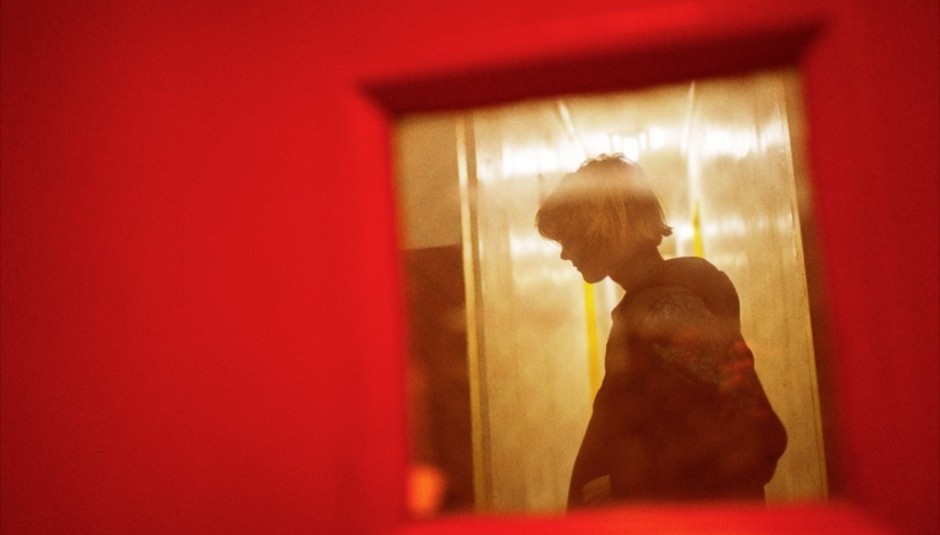“It’s intense that this record’s finally going to be out in the world. I think a lot about how it might have been, if all this stuff in my life hadn’t happened.”
Four years ago, DIIV released their first record, Oshin, into a world that was by no means crying out for another melodic guitar band. Even their label probably had too many of them; Brooklyn’s Captured Tracks have, since 2008, made woozy mood pieces and reverb-drenched nostalgia their calling card, through the likes of Beach Fossils, Wild Nothing and Mac DeMarco. They put out Oshin in the summer of 2012, and whilst it bore superficial similarities to plenty of DIIV’s stablemates, a scratch beneath the surface quickly suggested they’d struck upon a way to set themselves well apart from their peers. Zachary Cole Smith, the group’s frontman and solitary songwriter, evidently has scant regard for traditional structure; there’s a thrilling fluidity to his best work, a looseness that hints at a some kind of skeleton being there without much evidence that it’ll ever be eviscerated. Instead, the guitars move without apparent direction but certainly not whilst lacking in purpose; they’re quick and sharp and frequently exude drama. Smith had hit upon something special, and he did it with clever brush strokes, and real concision; he smudged the charcoal hazily in some places, and tightened other parts to the point of perilous tension. In short, Oshin was something that sounds like a contradiction in terms; an urgent dream-pop record.
Anything that so much as threatens to break the mould in the stultified world of modern guitar music is going to have people sitting up and taking notice, and accordingly, Oshin didn’t want for lavish praise. DIIV toured heavily, and as the band’s profile grew, so did Smith’s. Previously, about as much as anybody seemed to know about him was that he’d briefly played in Beach Fossils, but once Oshin took off, the press suddenly had him pegged as the hipster king of Williamsburg; somehow irresistibly cool in comically outsized clothing, and the one guy from that scene who’s music seemed to be relentlessly looking forwards, not back. His romantic involvement with Sky Ferreira played a part, too. Smith, continually outspoken about his near-obsessive love for Nirvana, invites physical, personal and musical comparison to Kurt Cobain - parallels he has done the sum total of nothing to dismiss. Ferreira is a prodigiously talented songwriter in her own right. It was hard to shake the feeling that the media were slowly lining them up as the next Kurt and Courtney.
In September of 2013, the perfect opportunity to cast the couple as such was served up on a plate. Smith - by now at work on DIIV’s second LP - and Ferreira, who was in the thick of touring for her own album, were driving to the Basilica Music Festival in upstate New York when they were pulled over. There was ecstasy in the car - and heroin. The harder drugs were Smith’s, but the fallout, in professional terms, hit Ferreira harder; she lost a string of modelling contracts. When I speak to him in the middle of a press trip to London last December, Smith is disarmingly forward about the incident, bringing it up quickly and practically without being prompted. “There’s songs on this record that predate the arrest, and they’re not as dark as the ones that came after. They’re not as intensely personal.”
The road to Is the Is Are, finally released this month, has been strewn with turbulence. Not all of it relates to the drug bust, but it’s swiftly clear that Smith considers it the pivotal moment in the album’s development. “It gave the public a bit of a starting point, I guess. It gave me a reason to be as honest and forthcoming as possible, because a lot of people had questions about me, as well as their own judgements and ideas about who I was and what I was doing. I wanted the album to humanise me; people talk a lot of shit about our band on the internet, and I think I hoped that I could change their perspective by presenting myself as a person, rather than the disposable commodity that so many of them see musicians as.”
In doing so, he hasn’t tried to temper his already-existing persona, or shy away from his personal issues. Smith spent time in rehab in January 2014, and when he talks about the process - both the literal time spent at a clinic, and the larger process of making his second album - there’s quickly an unsolicited reference to his biggest musical hero. “A lot of the stuff I went through served this purpose of being in rehab,” he explains, “and knowing the feeling of wanting to jump over the fence and escape - even when all you have to do is check out at the front gate and leave, right? You’re there voluntarily. But Kurt Cobain, before he went home and shot himself, jumped over the fence of the facility he was staying at, because walking out and saying you want to leave is embarrassing. You’re admitting that you’re giving up on yourself, almost. I remember feeling that same way. There’s those human emotions that come with addiction that are stripped away when you hold people up to be these martyr-like rock stars. There becomes this myth that I wanted to cut through - by making something that presented me as a person, first and foremost.”
There’s definitely a leap from Oshin, which felt distant, and clinical, and cleverly economical in terms of ideas and duration. At one stage, Smith talks about his admiration for Jerry Seinfeld, and in particular the manner in which he spends years trying to cut away anything even remotely extraneous from his jokes - just one word where it isn’t needed, he says, can make all the difference. Is the Is Are, though, feels like Smith spilling out everything he had and deciding that cleaning up too much of the ensuing muddle would be to round off the edges a little too smoothly. This is, after all, supposed to be a document of a long period of serious upheaval. Its release, he admits, was always “kind of the light at the end of the tunnel, the thing that was going to pull me out of this period.” He’d always intended to follow up Oshin with a double-length record, too: “by delivering something substantial, I felt we could show that we weren’t a flash-in-the-pan buzz band, which a lot of people expected us to be.” In the end, though, it happened less out of intent than necessity - what might have been detached and calculated has ended up an epic tale of love among the ruins that, for Smith’s money, demanded a sixty-three-minute running time.
“The stakes gradually got higher and higher,” he recalls of the Is the Is Are’s increasingly controversial gestation. “I ran the risk of being, for the rest of my life, a footnote - the guy who was arrested with Sky Ferreira, or whatever. I was seeing the record more and more as a chance at salvation, and it took on almost life-or-death importance. I felt like I needed to make a statement, to show some ambition, even more than in the beginning, and at the same time, the songs were becoming more and more diverse, lyrically and musically.”
“I’ve said that, in a lot of ways, the past couple of years of my life have been the worst, but at the same time, I was also falling in love with somebody, and becoming successful doing something that I’d always wanted to - becoming a musician, a real, actual one. There was a lot to fit in, and I know I was maybe risking the album being disjointed or all over the place, but it all feels vital to me. Every song serves its own purpose.”
From an outsider’s perspective, you got a similar sense that Smith was going to need to pull off something spectacularly redemptive with Is the Is Are, not least because, as the months wound on with no news on new music, more and more self-inflicted damage was being done to the DIIV name. In December 2014, bassist Devin Ruben Perez took to internet cesspool 4chan to play what appeared to be a deeply ill-advised game of bigotry bingo; posts attributed to him ticked off racism (Zomby was the target), misogyny (with Grimes and Perfect Pussy’s Meredith Graves on the receiving end), and homophobia (liberal use of ‘faggot’) before the blog Sexism in Music flagged them and stopped a potential full house in its tracks, although not before he’d thrown in an anti-Semitic joke for good measure. Smith apologised profusely and claimed that his policy on such matters was one of zero tolerance. Perez also responded, by returning to 4chan, which is a bit like vandalising somebody’s car and then going back to scratch an apology into the paintwork. If, of course, one had actually been forthcoming. “I honestly don’t regret saying any of the stuff that I did,” he wrote. “No fucks given at all. It was all the truth really.” He remains a member of DIIV.
If that was the point at which some fans of the band decided to take their leave, plenty more remained unswerving in their devotion. The group have a lot of young fans, teenagers, who wear their fandom quite literally on their sleeves. They adhere to what, in recent times, we can refer to as the Mac DeMarco phenomenon; DIIV shows tend to be populated, in large part, by mini-Smiths, drowning in their huge jumpers, scruffy hair jutting out from under old baseball caps. Smith’s discussion of his drug use has been consistently candid, unusually open, but with so many young followers of his band - some of them doubtless impressionable - you wonder whether he’s considered the potentially disastrous consequences of statements like this one, offered to Stereogum in 2014: “I’ve just always been the kind of person that you can’t say to me, ’That stove is too hot, don’t touch it. I have to just touch it and figure out how hot it is - you know, hold my hand just above it, or touch it with my little finger.”
As it turns out, he has thought about it. Agonised over it, by the sounds of it. He discusses it sensibly, obviously looking to strike a middle ground between avoiding glamorising his struggle with addiction and continuing to be as honest as possible. “The record is like a cautionary tale,” he explains. “You don’t necessarily have to engage with the story behind the music, but if you do, that’s what’s there. It’s a clear message: this is what happened to me, and it was fucking horrible, and chances are, it’ll be your experience too if you make that decision. There’s that saying, that a smart man will learn from his own mistakes, but a wise man learns from other people’s. I guess I’ve never had that wisdom, personally, but I am trying to create a new entry in the story - or the discourse on - drugs and rock and roll. Obviously it’s a connection that’s older than God, but I’ve tried to show every side of that relationship, without promoting it. If I can help one person - or even save one person - then I’ll have done something worthwhile.”
On current evidence, he has saved at least one person; himself, as he’s sober now. To romanticise the circumstances surrounding Is the Is Are would be deeply misguided, but it is unquestionably a product of the environment it was written in - always stormy and occasionally chaotic. It’s a fine record, and confirmation that Smith’s considerable abilities as a musician have not been diminished by his poor personal decision-making. It will win back some fans disenchanted by the messy sideshows and perhaps further alienate others; true redemption with the public might be beyond his grasp for now, but Is the Is Are has granted Smith personal salvation. For a man who’s been to hell and back, he’ll surely consider that more valuable.
Is the Is Are is available now via Captured Tracks.
DIIV tour the UK from March 17th 2016.























